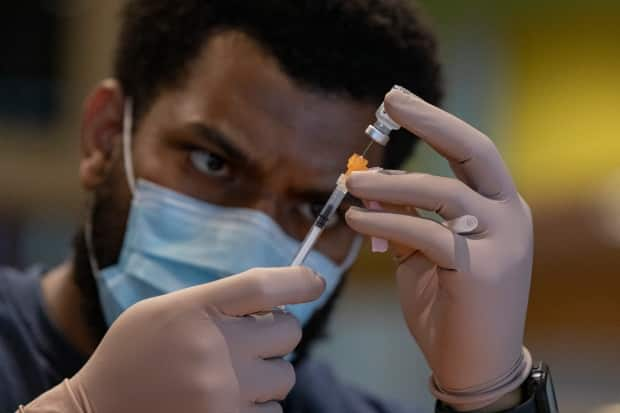Ontario sees 3,424 new COVID-19 cases, new high of more than 141,000 vaccines

Ontario reported another 3,424 cases of COVID-19 and 26 more deaths linked to the illness on Thursday, as the number of patients in hospitals, intensive care and on ventilators all dropped for the first time in weeks.
Yesterday there were a total of 1,964 people hospitalized with COVID-19. Of those, 877 were being treated for COVID-related critical illnesses in intensive care and 600 required a ventilator to breathe, both slight drops from the day before but still relatively very high.
For reference, there were about 420 patients in ICUs and 315 on ventilators at the peak of the second wave back in mid to late-January.
The new cases, which come after two straight days below the 3,000 threshold, include 958 in Toronto, 900 in Peel Region, 291 in York Region, 175 in Durham Region and 155 in Hamilton.
"We are seeing some early signs of improvement," Associate Medical Officer of Health Dr. Barbara Yaffe said at a news conference. "The public health measures are having some effect, as is the continued vaccination rollout."
Yaffe did caution, however, that hospitalization numbers need to drop significantly to ease the strain on the province's health system.
"Those numbers are still far too high," she said.
When asked if people could expect any loosening of public health restrictions later in May and heading into June, Yaffe said the province is having "active discussions" around thresholds for any loosening of restrictions.
"We don't know yet, of course," she said.
But given that case numbers and hospitalization numbers remain high, Yaffe said she would be "surprised if things open up in the end of May.
"We don't want to open prematurely and end up with a fourth wave," Yaffe said.
Labs completed 54,118 tests and Public Health Ontario logged a provincewide positivity rate of 6.8 per cent.
The seven-day average of daily cases fell again, down to 3,369. The indicator has been trending downward for more than two and a half weeks.
Another 3,997 infections were marked resolved in today's provincial update. There are about 34,377 confirmed, active cases of COVID-19 in the province.
The 26 additional deaths of people with the illness push the official toll to 8,213. The seven-day average of daily deaths stands at 26.3, down from 28.4.
New single-day high for vaccinations
Public health units collectively administered a new high of 141,038 doses of COVID vaccines yesterday, according to the Ministry of Health.
Some 5,356,172 people in the province, or about 46 per cent of all adults, have had at least one dose of a vaccine. Health officials said yesterday they expect two thirds of all adults in Ontario to have had a first shot by the end of May.
Ontario has used 5,740,761, or about 86.5 per cent, of the 6,635,725 total doses it has received to date.
People aged 50 and older across Ontario are among a number of new groups who can book a COVID-19 vaccine appointment starting today.
The province announced Wednesday the 50-and-older age group, in addition to those with high-risk health conditions, and a number of employees who cannot work from home are now eligible to get a shot.
The newly eligible workers include those in the education, child care, and the food and manufacturing sectors.
People aged 18 and up can book vaccine appointments if they live in one of 144 provincially-designated hot spot postal codes as of this week. Peel Region, however, announced it will be offering vaccines to all residents aged 18 and older — not just those in hot-spot neighbourhoods — starting today, weeks ahead of the province's schedule.
Meanwhile, groups representing thousands of health-care workers say their members need to be prioritized for full immunization from COVID-19 as they work with patients hospitalized with the virus.
The Registered Nurses' Association of Ontario, Canadian Union of Public Employees, and Service Employees International Union say they have asked the province to accelerate second doses for the workers but have received no commitment.
Health-care workers were among the initial groups to be prioritized for a first dose of the shot.
Since Ontario's vaccine effort began, however, the province has extended dosing intervals for COVID-19 shots from 21 days to four months due to supply shortages.
The group representing the health-care workers say the government needs to ensure the employees get second doses soon because they remain at risk when working with patients who have more transmissible COVID-19 variants.
A spokeswoman for the health minister says as the province receives more vaccines it may eventually be able to shorten the dosing interval for all Ontarians.

